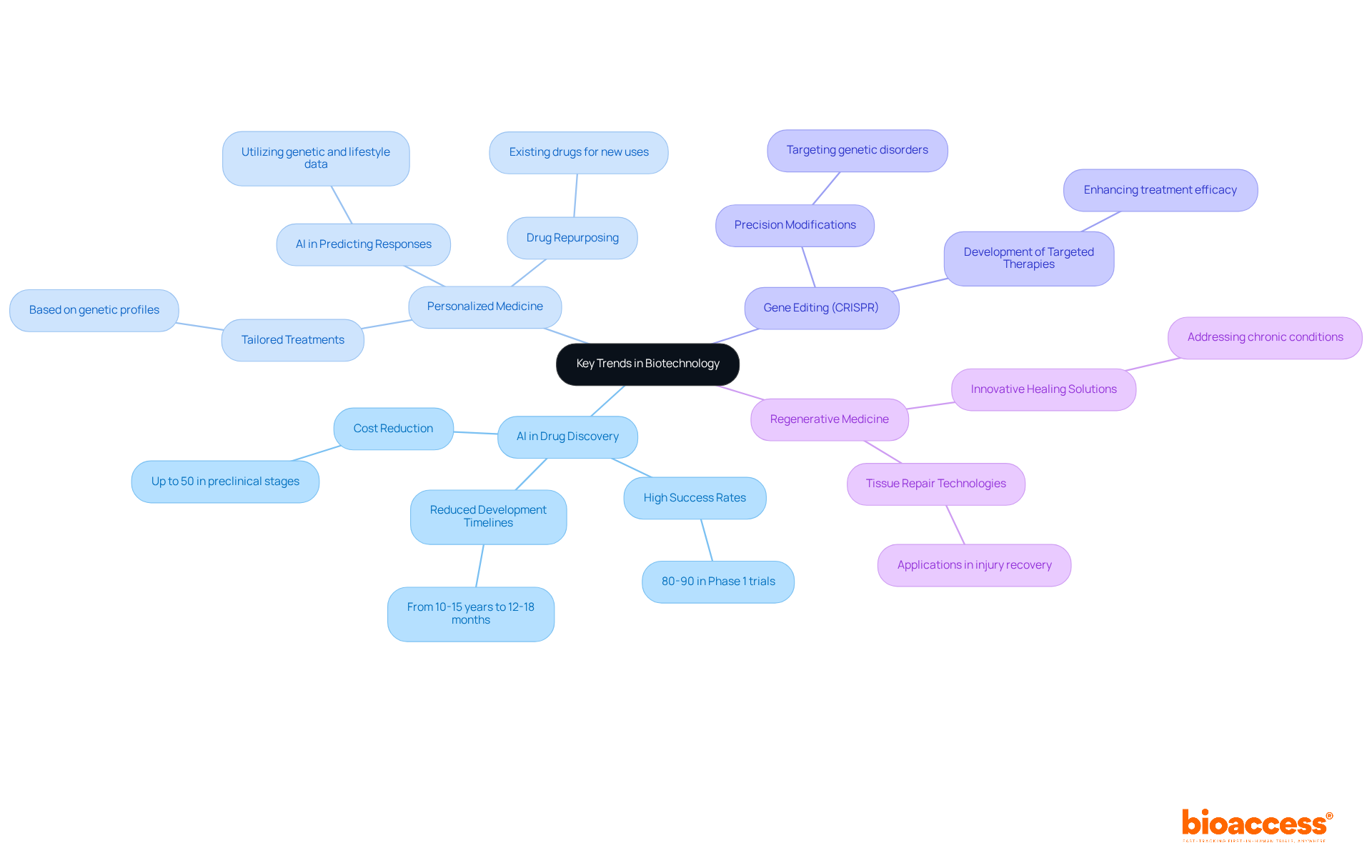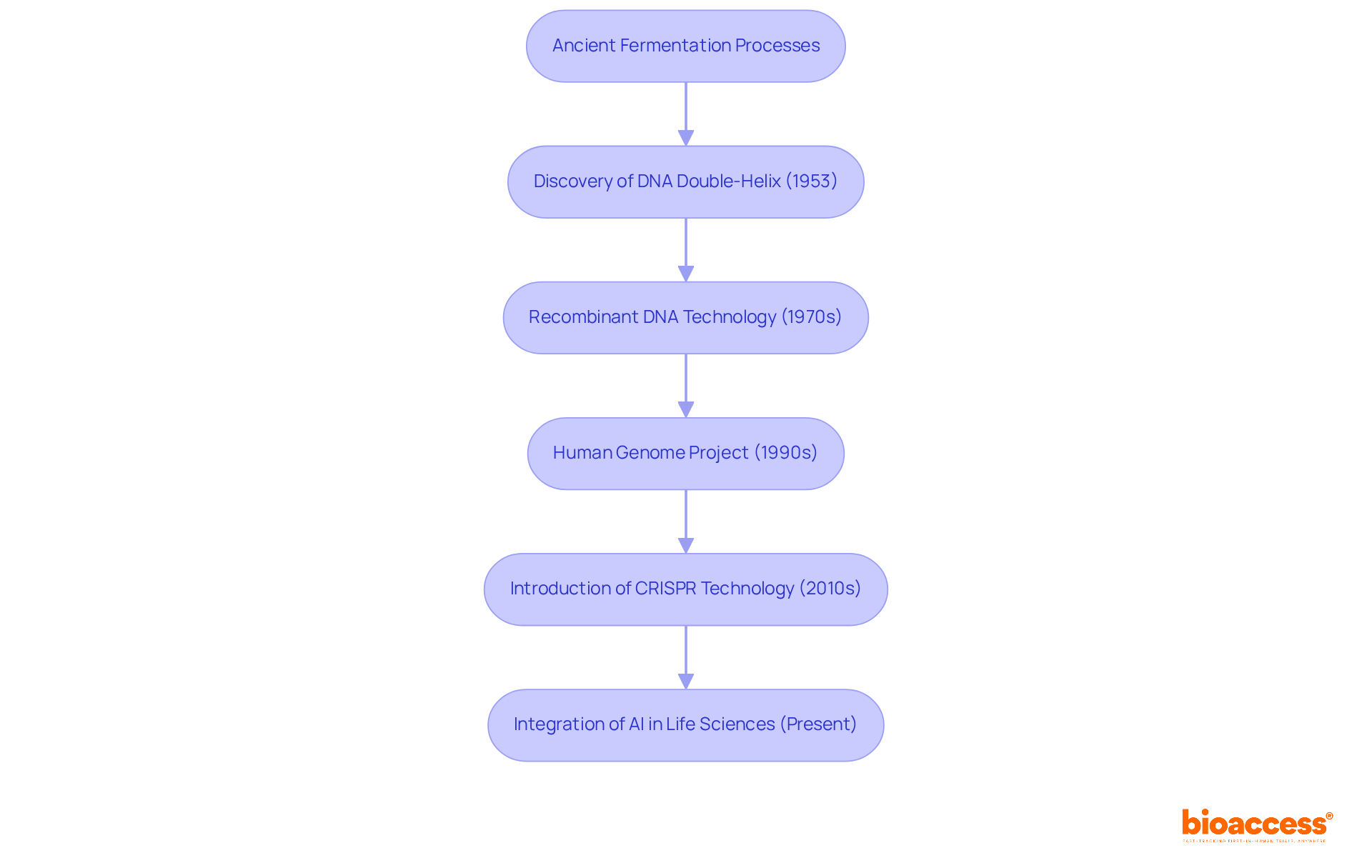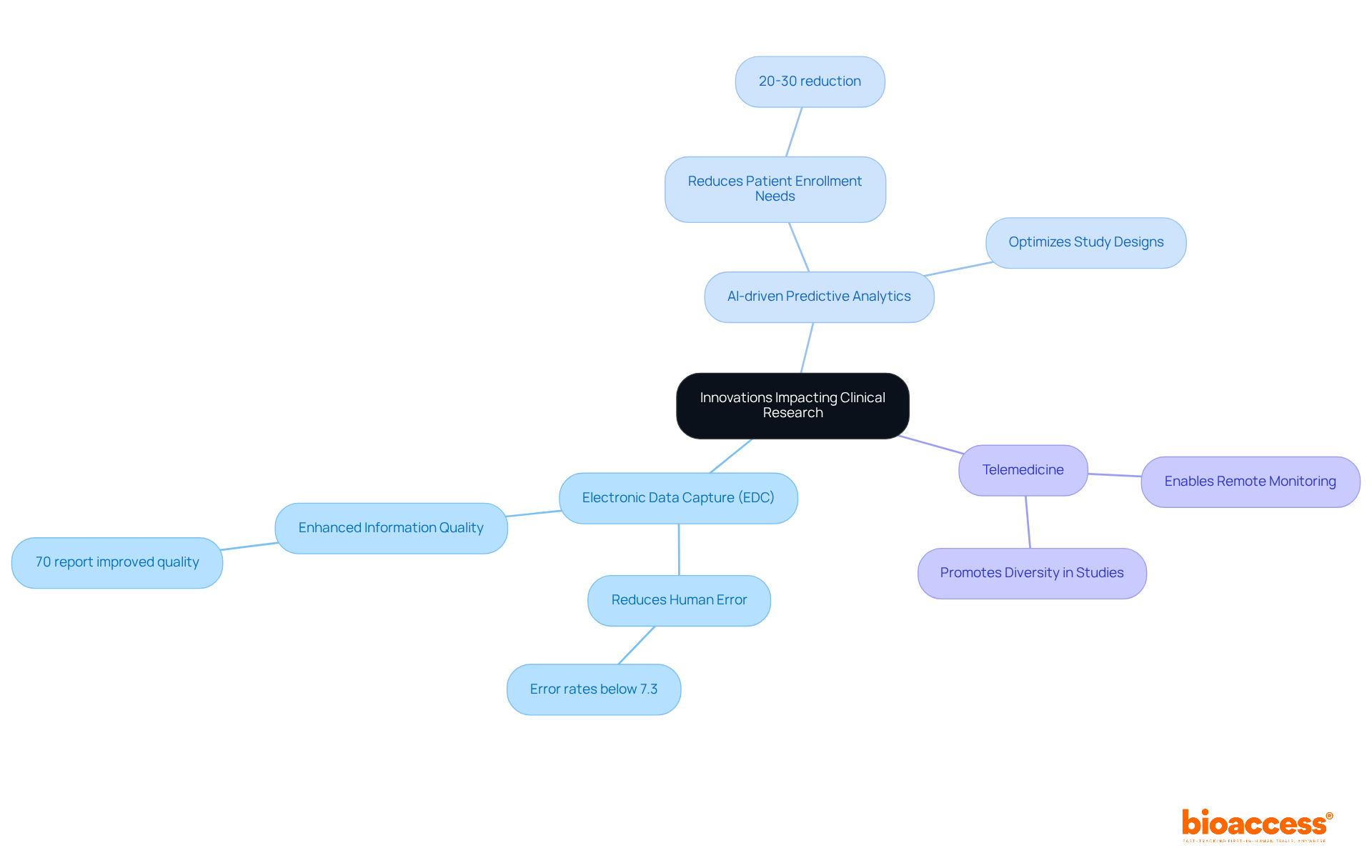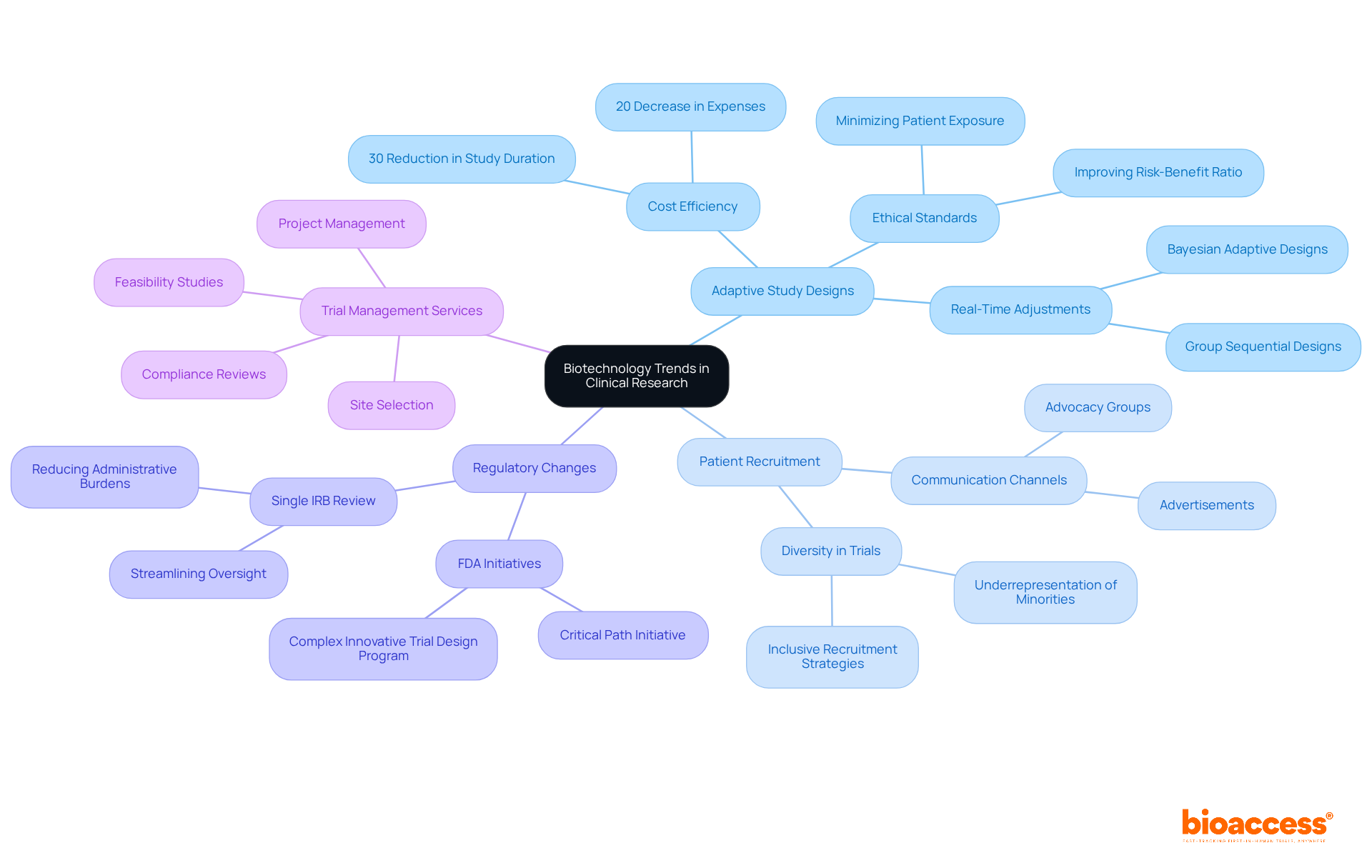


The article highlights pivotal trends in biotechnology that are significantly influencing clinical research. These trends include:
Collectively, these developments are revolutionizing drug discovery processes, enhancing patient-centric approaches, and increasing the efficiency and accuracy of clinical trials. Notably, artificial intelligence has demonstrated a remarkable ability to reduce drug development timelines and substantially improve trial success rates.
The landscape of biotechnology is rapidly evolving, driven by groundbreaking innovations that promise to redefine clinical research and healthcare delivery. This transformation is marked by the integration of artificial intelligence, personalized medicine, and advanced gene editing technologies, which not only accelerate drug discovery but also enhance the precision of treatments tailored to individual patients.
However, as these advancements unfold, they raise critical questions regarding ethical considerations and the necessity for inclusive research practices.
How will these trends shape the future of clinical trials and ultimately transform patient care?
Key trends in life sciences are prominently defined by the rise of artificial intelligence (AI) in drug discovery, the expansion of personalized medicine, advancements in gene editing technologies like CRISPR, and a growing focus on regenerative medicine. AI is revolutionizing the drug discovery process by enabling researchers to analyze vast datasets more efficiently, leading to a reduction in drug development timelines from five years to as little as 12-18 months in preclinical stages. This acceleration is crucial, as traditional drug discovery typically takes 10 to 15 years and costs billions of dollars. Additionally, AI-driven analytics have demonstrated an impressive 80-90% success rate in Phase 1 trials for AI-discovered drugs, significantly exceeding the overall trial success rate of under 15%, emphasizing the effectiveness of AI in enhancing trial outcomes.
Personalized medicine is another pivotal trend, tailoring treatments to individual genetic profiles, which enhances efficacy and minimizes adverse effects. This approach is increasingly supported by AI technologies that predict patient responses based on genetic and lifestyle data, marking a shift towards patient-centered care. For instance, AI has been instrumental in drug repurposing efforts, allowing existing medications to be adapted for new therapeutic uses, as seen with drugs like metformin being investigated for anti-cancer properties.
Moreover, advancements in gene editing technologies, particularly CRISPR, are revolutionizing the treatment of genetic disorders by enabling precise modifications at the DNA level. This capability not only holds promise for curing genetic diseases but also enhances the development of targeted therapies.
Regenerative medicine is gaining traction as well, offering innovative solutions for healing and tissue repair, which are critical in addressing chronic conditions and injuries. As the trend in biotechnology continues to evolve, it is transforming the life sciences landscape and significantly affecting clinical research methodologies and outcomes, paving the way for more effective and personalized healthcare solutions. Additionally, the AI in pharmaceutical market is projected to grow from $1.94B in 2025 to $16.49B by 2034, underscoring the increasing importance and investment in AI technologies within the industry. However, it is essential to consider the ethical implications surrounding AI in healthcare to ensure responsible development and application.

The development of biological technology has its roots in ancient civilizations, where fermentation processes were first utilized. The modern era of biotechnology commenced in the 20th century with the groundbreaking discovery of DNA's double-helix structure in 1953, fundamentally transforming our understanding of genetics. The advent of recombinant DNA technology in the 1970s facilitated the creation of genetically modified organisms, leading to significant advancements in medicine and agriculture. This foundational technology has served as a pivotal tool for engineering biological systems for over 30 years.
The Human Genome Project, initiated in the 1990s, represented a monumental undertaking that successfully mapped the entire human genome. This endeavor provided invaluable insights into genetic diseases and paved the way for personalized medicine. Not only did this project emphasize the intricacy of human genetics, but it also encouraged further exploration into gene therapy and biopharmaceuticals. Currently, the trend in biotechnology is reflected in the global biotech market, which is valued at approximately $727.1 billion and projected to expand at a compound annual growth rate of 7.4% by 2025, underscoring the industry's growth and significance.
In the 2010s, the introduction of CRISPR technology revolutionized genetic engineering, enabling precise and efficient gene editing. This innovation has opened new pathways for exploration and therapeutic applications, significantly impacting areas such as oncology and genetic disorders. Leon Kass noted a widespread enthusiasm for the potential of life sciences to cure diseases and alleviate suffering, reflecting the optimism surrounding these advancements.
Presently, life sciences are swiftly progressing, increasingly incorporating digital technologies and artificial intelligence to enhance development processes. This convergence is anticipated to drive further innovations, establishing a trend in biotechnology as a crucial element in addressing global health issues and advancing medical studies.

Innovations reshaping clinical research prominently include:
EDC systems streamline data collection and management, significantly reducing human error rates to below 7.3% within 1.5 years of implementation. This improvement in data integrity is essential, as 70% of EDC users indicate enhanced information quality, resulting in more dependable study outcomes.
AI algorithms further enhance this process by analyzing extensive datasets to identify suitable patient candidates, optimize study designs, and predict outcomes with greater precision. For instance, AI has been shown to reduce patient enrollment needs by 20-30%, enhancing recruitment efficiency.
Telemedicine has gained momentum, especially in the post-pandemic environment, enabling remote patient monitoring and involvement in studies. This method not only expands access but also promotes diversity in medical studies.
Together, these advancements enhance the pace and precision of studies while greatly boosting patient involvement and retention, ultimately leading to more successful results.

The implications of the current trend in biotechnology for clinical research practices are profound. The integration of AI and machine learning is leading to more adaptive study designs, allowing researchers to modify protocols in real-time based on interim results. This flexibility can significantly shorten study durations by up to 30% and decrease expenses by as much as 20%, according to the Tufts Center for the Study of Drug Development.
Furthermore, the emphasis on personalized medicine necessitates a transition towards more specific patient recruitment strategies, ensuring that studies reflect diverse populations. The insufficient representation of African Americans and Hispanics in research studies underscores the necessity for more inclusive recruitment methods.
Regulatory bodies are adapting to these changes, exemplified by initiatives like the FDA's Critical Path Initiative and the Complex Innovative Trial Design Paired Meeting Program, which streamline approval processes for innovative therapies.
Moreover, bioaccess provides extensive trial management services, including:
These services are crucial for navigating the intricacies of contemporary scientific investigations. They enhance operational efficiency and contribute to driving global health improvement through international collaboration and innovation in Medtech.
Adaptive designs also enhance ethical standards by minimizing patient exposure to ineffective treatments. Overall, the trend in biotechnology is fostering a more efficient, patient-centric approach to clinical research, ultimately improving the speed at which new therapies reach the market.

The landscape of biotechnology is undergoing a transformative shift, driven by innovative advancements that are reshaping clinical research and healthcare delivery. The integration of artificial intelligence, personalized medicine, gene editing technologies, and regenerative medicine not only enhances the efficiency of drug development but also paves the way for more tailored and effective treatment options. As these trends continue to evolve, they signify a move towards a more patient-centric approach in healthcare, essential for addressing the complexities of modern medical challenges.
Throughout this article, key insights highlight the pivotal role of AI in streamlining drug discovery processes, the importance of personalized medicine in improving treatment efficacy, and the revolutionary impact of gene editing technologies like CRISPR. Additionally, the rise of telemedicine and electronic data capture systems has significantly improved clinical trial methodologies, leading to better patient engagement and more reliable outcomes. These innovations collectively underscore the necessity for adaptive and inclusive research practices that reflect the diverse populations they aim to serve.
As the biotechnology sector continues to expand, it is crucial for stakeholders to remain vigilant about the ethical implications of these advancements. Emphasizing responsible development and application will ensure that the benefits of biotechnology are accessible to all. The ongoing evolution in this field presents an exciting opportunity for researchers, healthcare providers, and policymakers to collaborate towards a future where innovative solutions can effectively address global health challenges. Engaging with these trends not only enhances the potential for breakthroughs in clinical research but also reinforces the commitment to improving patient care worldwide.
What are the key trends in biotechnology?
Key trends in biotechnology include the rise of artificial intelligence (AI) in drug discovery, the expansion of personalized medicine, advancements in gene editing technologies like CRISPR, and a growing focus on regenerative medicine.
How is AI impacting drug discovery?
AI is revolutionizing drug discovery by enabling researchers to analyze vast datasets more efficiently, reducing drug development timelines from five years to as little as 12-18 months in preclinical stages. AI-driven analytics also show an 80-90% success rate in Phase 1 trials for AI-discovered drugs, significantly higher than the overall trial success rate of under 15%.
What is personalized medicine and how is it related to AI?
Personalized medicine tailors treatments to individual genetic profiles, enhancing treatment efficacy and minimizing adverse effects. AI technologies support this approach by predicting patient responses based on genetic and lifestyle data, facilitating a shift towards patient-centered care.
What role does CRISPR play in biotechnology?
CRISPR is a gene editing technology that allows for precise modifications at the DNA level, revolutionizing the treatment of genetic disorders and enhancing the development of targeted therapies.
What is regenerative medicine and why is it important?
Regenerative medicine focuses on innovative solutions for healing and tissue repair, which are critical in addressing chronic conditions and injuries. It is gaining traction as a vital area of biotechnology.
How is the market for AI in pharmaceuticals expected to grow?
The AI in pharmaceutical market is projected to grow from $1.94 billion in 2025 to $16.49 billion by 2034, indicating significant investment and importance of AI technologies in the industry.
What ethical considerations are associated with AI in healthcare?
It is essential to consider the ethical implications surrounding AI in healthcare to ensure responsible development and application, although specific ethical concerns are not detailed in the article.